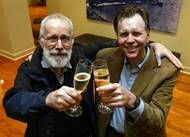Marshall and Warren win Nobel for work on Helicobacter as cause of peptic ulcers
But I thought biologists were too “close-minded?”

Australians Barry J. Marshall and Robin Warren won the 2005 Nobel Prize in medicine Monday for showing that bacterial infection, not stress, was to blame for painful ulcers in the stomach and intestine.
The 1982 discovery transformed peptic ulcer disease from a chronic, frequently disabling condition to one that can be cured by a short regimen of antibiotics and other medicines, the Nobel Prize committee said.
Thanks to their work, it has now been established that the bacterium Helicobacter pylori, which the new Nobel winners discovered, is the most common cause of peptic ulcers.
After proposing that idea, Marshall and Warren had to persevere in the face of skepticism. Marshall even deliberately infected himself with the bacterium in 1985 and showed it caused stomach inflammation, a potential precursor of an ulcer.
‘No one believed it’ The Australians’ idea was “very much against prevailing knowledge and dogma because it was thought that peptic ulcer disease was the result of stress and lifestyle,” Staffan Normark, a member of the Nobel Assembly at the Karolinska institute, said at a news conference.
This is a great example of how science works. These men proposed a hypothesis that was pretty far outside the mainstream at the time (even though there had been some antecdotal and published evidence regarding antibiotic treatment and resolution of ulcers). They tested it; they gathered evidence to support it; they published their results in the literature; and eventually, they overturned the prevailing notion that ulcers were caused by stress and diet based on the experimental evidence. They didn’t rely on think tanks, or mission statements, or pressure from supporters in high places in order to have their ideas accepted–they won over their audience on the merits of their research. Was it easy? From interviews I’ve read, hell no. But they perservered, others joined them in uncovering evidence that supported their hypothesis, and today, they’ve been rewarded with one of the highest honors that a scientist can receive. Congratulations, gentlemen, and let this serve as yet another example of scientists embracing new ideas when they’re backed by quality research.
Edited to add: Carl Zimmer has a great piece on this over on The Loom. He mentions one thing I didn’t touch on, but is a damn good point:
But it also illustrates a point that I made when last year’s Nobelists were announced: it demonstrates how intimately woven evolutionary biology is becoming with medicine.
Check out his post for further elaboration…he also has a link to a .pdf review showing how variation in H. pylori (and other microbes) are being used to investigate past human migrations.
And…one more comment from Derek Lowe also on Corante (In the Pipeline):
Crazy ideas won’t necessarily get you tossed out of the club. Crazy ideas with nothing to back them up will. But just come back with the evidence, and they won’t be crazy any more. Show me the religion that takes its heretics and makes them bishops, won’t you?
Well said.
